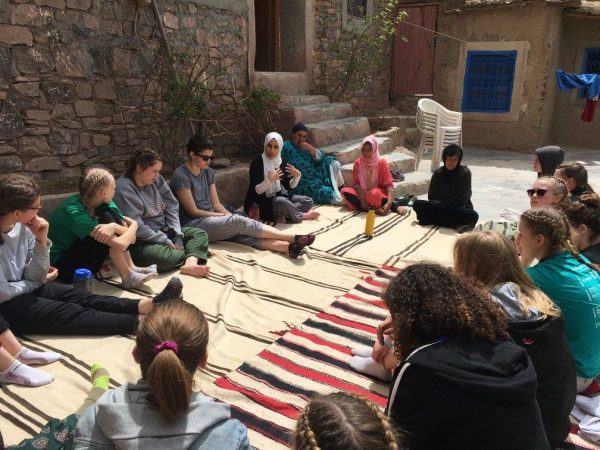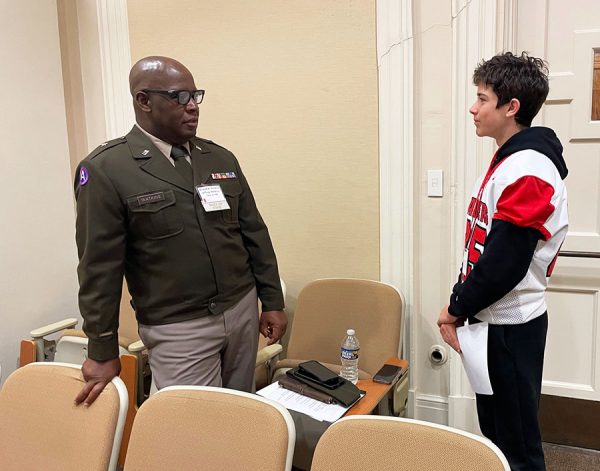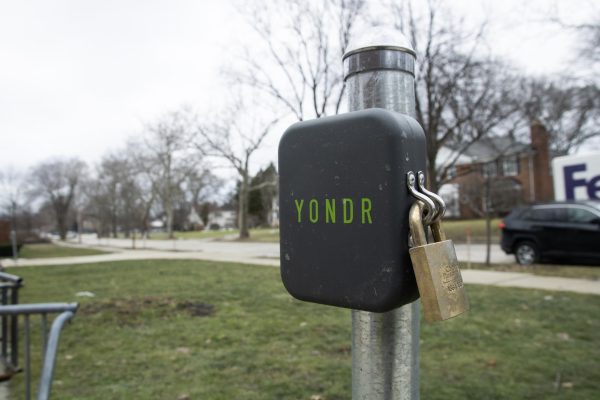Recent Student Suspensions Provoke Questions
The Shakerite spoke with Principal Jonathan Kuehnle and ACLU of Ohio attorney Elizabeth Bonham to make sense of which rights students do have, and which they don’t.
The events of the past few weeks have raised questions among Shaker students, staff and community about the First Amendment, school policy and equity.
The American Civil Liberties Union of Ohio sent a Nov. 14 letter to the district asking that sophomore Myyah Husamadeen’s suspension be rescinded.
Husamadeen was assigned in-school suspension for disruption that, according to school officials, occurred when she tweeted screenshots of racist text messages sent by a Shaker student. She was to serve her suspension Tuesday, Nov. 15. According to Husamadeen, administration replaced her suspension with an alternative punishment.
A second student, junior Elena Weingart, also posted screenshots of texts from the same Shaker student, but served her in-school suspension Friday, Nov. 11, before Shaker received the ACLU of Ohio’s letter.
“I was never offered anything [other] than in-school suspension.” Weingart said.
Local and national online discussions included accusations that the district singled out the students who posted the offensive text messages for discipline. A Nov. 11 student blackout and walkout were planned to protest the fact that Husamadeen and Weingart had been disciplined, while the student who originally made the racist comments presumably was not.
However, Principal Jonathan Kuehnle stressed that “one of the rumors out there is that not all of the students were addressed. That is a falsehood.”
According to Kuehnle, the administration addressed in some way all three students involved in the social media incident. This fact was posted Nov. 12 at the district website, where a statement about the incident from Superintendent Gregory C. Hutchings, Jr. included the sentence, “In response to ongoing questions, I would like to reiterate that the situation has been addressed with all parties involved.”
Federal law prohibits the release of students’ educational records, including disciplinary records, without parental or custodial consent.
Beyond the questions about fairness in disciplinary action, questions about the school’s right to discipline students for online speech arose. Elizabeth Bonham, a staff attorney at the ACLU of Ohio, said that one thing is very clear in terms of school speech. “There are limits to how far a school can stretch its authority. So, one of the considerations in school speech cases is, were the students doing this on their own time, or was this an in-school activity causing a disruption at school?” she said.
Bonham added that First Amendment law regarding high school students holds that “schools can reasonably limit some speech, but students don’t shed their constitutional rights at the schoolhouse door.”
Kuehnle also cited law concerning student speech. “Generally speaking, whatever is happening online or on social media, it has to cause some disruption of the educational process at school,” he said. “That’s the basis of all school discipline according to the Supreme Court.”
The Supreme Court case to which Kuehnle referred is the 1969 landmark case Tinker v. Des Moines Independent Community School Dist. In their ruling, the court stated that “[s]tudents in school, as well as out of school, are ‘persons’ under our Constitution. They are possessed of fundamental rights which the State must respect . . . They may not be confined to the expression of those sentiments that are officially approved. In the absence of a specific showing of constitutionally valid reasons to regulate their speech, students are entitled to freedom of expression of their views.”
But, Tinker specified that student expression resulting in a “substantial disruption of or material interference with school activities” was grounds for student discipline.
However, Bonham said that, in the case of Weingart and Husamadeen, “it appeared that there wasn’t a disruption in this school at all. This was off-campus speech that wasn’t really implicating the school day, but rather discussing a political issue that’s publicly relevant.”
Kuehnle referred to the 2016-2017 Student Handbook, which states that a “student shall not use radios, stereos, televisions, telephones, pagers or other equipment in a manner determined by school authorities to be disruptive to the educational process or the orderly operation of the school.”
However, the handbook also states more generally that “Misuse of electronic devices or violation of the digital citizenship guidelines may result in disciplinary action, including suspension or expulsion,” and makes no mention of the need for an in-school disruption.
Those “digital citizenship guidelines” require students to “Be responsible and safe users” of technology, “support others by being respectful,” “not initiate or participate in online bullying,” and “report to an adult if the student feels unsafe or uncomfortable.”
Moreover, the handbook states that those guidelines apply to students “at school and at home.”
So, as the handbook suggests, does the school have the right to discipline students for misuse of technology, even if no disruption was directly caused by that misuse? Or, as the ACLU of Ohio contends, must there be an in-school disruption for the school to limit student speech?
The ACLU of Ohio argued the latter by writing in their letter that “When students express political views using social media, completely outside of the school environment, schools have no authority to regulate or punish their expression.”
Kuehnle addressed this discrepancy by saying that “it really depends on the context. We can’t just lay out a blanket statement.”
Bonham said that the ACLU of Ohio uses a “case by case analysis” when investigating student speech cases.
In this case, the ACLU of Ohio determined that Shaker did punish Husamadeen “for exercising her First Amendment rights,” according to their letter.
Nonetheless, said Bonham, “an in-school disruption will always weigh on the side of the school regulating speech.”
In a Nov. 18 interview with The Shakerite, Husamadeen said that she and Weingart were “called down and [the administration] basically said we caused disruption and since [the student’s] name was in [the social media posts], we opened her up for harassment. But that was never our intention.”
In a Nov. 15 interview, Husamadeen told The Shakerite that she was going to “reflect on the situation and write an essay, and that will determine if I will serve an in-school suspension, but I most likely will not.”
Bonham said that she couldn’t say whether the ACLU of Ohio would have taken legal action had the district not changed Husamadeen’s punishment.
“We’re lawyers, so we do in a given situation what’s best for our client,” she said. “In this scenario, we were not representing this student at any point. I can’t speak to whether we would have or what we would have done.”
Bonham added that the “most favorable outcome is to get a result without real legal action.”
Husamadeen’s choice between serving in-school suspension and writing a reflective essay in consistent with a new approach to discipline at the high school.
This year, said Kuehnle, discipline “includes a new practice that we’re incorporating into student policy this year: All assistant principals offered a mix of discipline and restorative practices.”
Restorative practices aim to amend student behavior through discussion and teaching, rather than punishment.
“We want you to learn from it, make it right, make it a one-time thing and move on,” said Kuehnle. “The point of discipline should be to change behavior.”
Kuehnle said that his goal is to prepare students for life after high school. “Tech is ubiquitous. It’s everywhere. It’s our job as a high school to prepare you for success after high school, and that includes technology,” he said. “We have to help you learn how to use it so that you’re set up for success.”
“As principal, you are responsible for working with a small city every day, and any time you bring together 2,000 people in a small space and bring together social media, there’s going to be some issues that pop up,” he said.”
“I think we’re also pulling together to address it and handle it in a meaningful and impactful way. Am I stressed? Sure, but that’s part of the job.”
Kuehnle went on to say that the presidential election played in a role in the events of the past few weeks. “Let’s be honest,” he said. “I think a lot of people had worked very hard on one campaign or the other.”
“Passions were high, and emotions were raw the day after. And I know some of it had to do with the unfortunate campaign rhetoric, some of which talked about race,” he added. “It was an unfortunate perfect storm.”
Nonetheless, Kuehnle said that Shaker looks for “teachable moments and learning opportunities in every controversial situation . . . Are we looking at continuously improving our practice? Absolutely.”
“One silver lining of recent events is that it has lent a special urgency to the work in which we are already engaged,” he said, and made reference to the district plans to focus on equity, enumerated in the Strategic Plan.
“Thanks to recent events, that might be expedited,” he said. “If you know the right thing to do, and you can take steps to do it, you do it as soon as is reasonable, as is possible.”
“You never stop learning, be it student, teacher or principal.”






